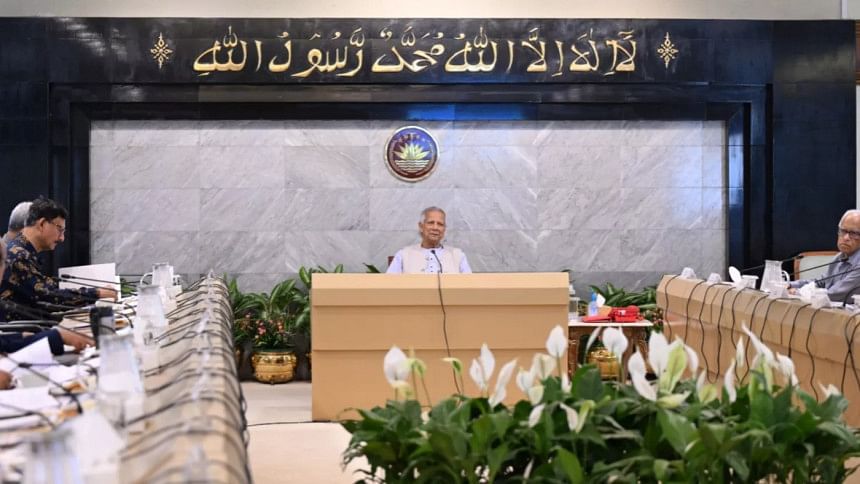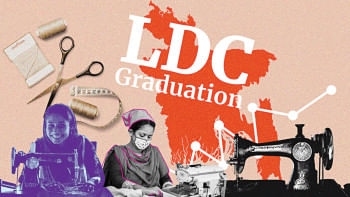LDC graduation: Ensure strong monitoring for smooth transition

There is no possibility of reversing the decision to graduate from LDC status, as the chief adviser has instructed all officials to ensure strong monitoring so that every sector remains unaffected, and the maximum benefits are reaped from the transition.
Officials after a high-level meeting regarding preparations for Bangladesh's graduation from LDC said they are confident about smooth transition and the government is set to have a separate strong trade negotiating body.
Chief Adviser Prof Muhammad Yunus, while presiding over the meeting at his office, also asked the officials concerned to take necessary precautionary measures to face any turbulence in the transition process.
"We have already made the decision [over LDC graduation]. We have to move at full speed," Chief Adviser's Press Secretary Shafiqul Alam quoted Prof Yunus as saying at a press conference at the Foreign Service Academy following the meeting.
Finance, planning, industries, education, and several other advisers, top officials of the ministries attended the meeting.
Bangladesh in 2018 met the criteria for graduation in all three categories -- per capita income, human asset index, and economic vulnerability index. It is expected to be upgraded in November 2026.
Many, including a section of economists and businesspersons, were in favour of a deferment by a couple of years.
They reasoned that the economy needed time to cope with the severe fallout of the pandemic, the Russia-Ukraine war, and high global inflationary pressure over the last few years.
"There is no way for us to turn back from here; rather our collective effort must focus on ensuring its safety. This is a national issue and requires united efforts from all of us," Anisuzzaman Chowdhury, special assistant to the chief adviser, told the briefing.
He said they are confident that there will be no problems, but there will be precautionary measures for any kind of hurdles.
The meeting decided to have a separate negotiating body as there is no such trade agency in Bangladesh although many developed countries like the US and Japan have such an entity.
He said economic diplomacy is on and that there are always challenges and opportunities.
Talking about businessperson's concerns, Anisuzzaman said that whether the transition to a developed country is delayed or not is irrelevant. Opportunities like duty-free access that Bangladesh is currently enjoying will not end in 2026. Australia has stated that the existing opportunities will remain, whether Bangladesh graduates or not. The UK has expressed the same sentiment. During the recent chief adviser's visit to China, they also assured continued support.
Regarding the possibility of the termination of concessional loans from international lenders after graduation, Anisuzzaman said, "Aid is not a very big issue for us … Even if we don't receive concessional aid, it will not create a major problem for us. Similarly, our dependence on aid has decreased over time."
He further mentioned that the government has taken steps to mobilise domestic resources and increase the tax-to-GDP ratio. "NBR reforms are being implemented, along with various policy changes. We are strengthening our position to stand on our own feet. We have sufficient strength."
Anisuzzaman said, "We believe that the garment sector will not be significantly impacted, as the existing opportunities will continue for some time."
On Bangladesh's progress in meeting the human rights and environmental conditions required to obtain GSP+ benefits, he said the chief adviser provided clear instructions to accelerate efforts in addressing these conventions promptly.
"The reform commissions and their reports will help us in this regard. Significant labour reforms have been implemented, along with democratisation efforts, which are part of addressing these issues."

 For all latest news, follow The Daily Star's Google News channel.
For all latest news, follow The Daily Star's Google News channel. 










Comments